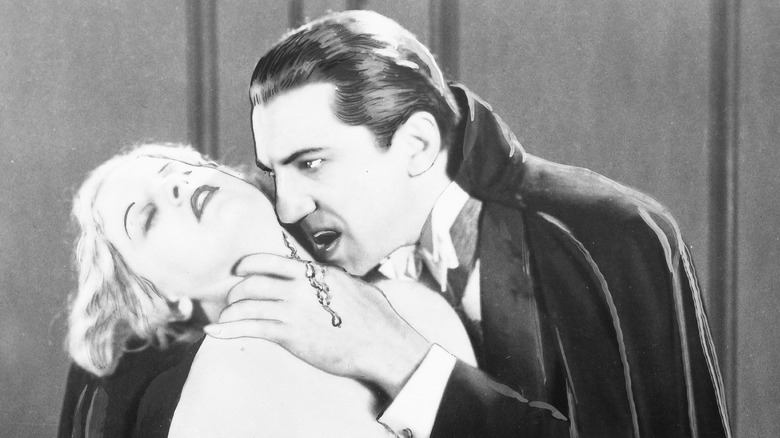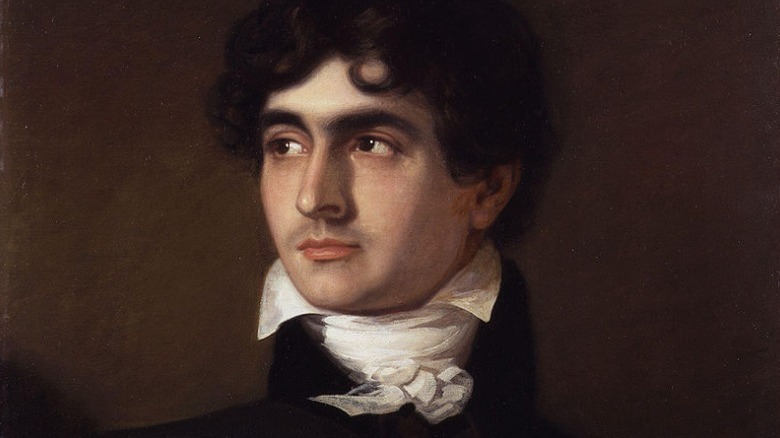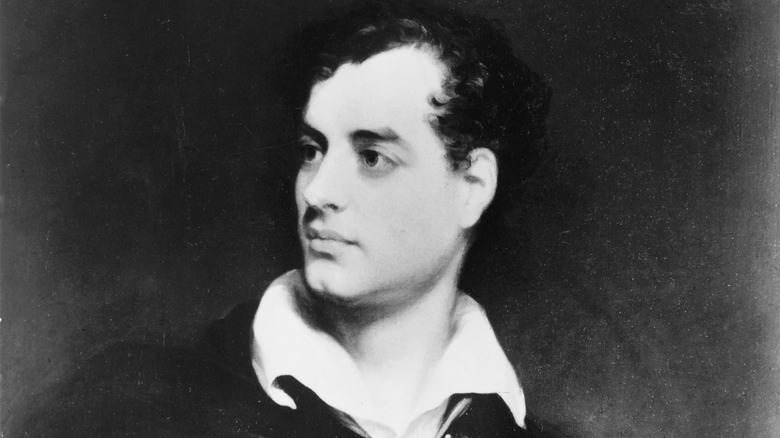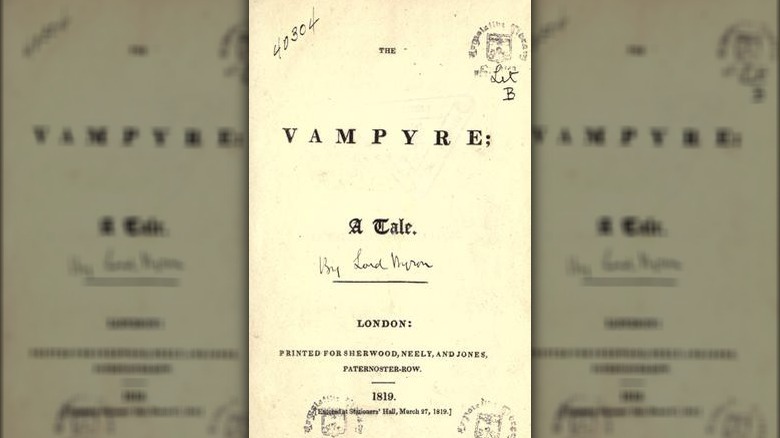Who Really Wrote The First Modern Vampire Story?
Tales of vampires and vampirism have entranced audiences around the world for hundreds of years. As noted by Britannica, stories of parasitic monsters that drank the blood of human victims circulated even in ancient Greece, but it was in plague-ridden medieval Europe that the legend became particularly widespread and folkloric, with peasants in lands such as Romania turning to the supernatural to explain strange and disturbing deaths. The same source notes that modern researchers have postulated that even biting may be explained as a symptom of rabies, which was rife in the area at the time.
However, these old folk tales are far removed from the modern conception of the archetypal vampire and all the conventions regarding vampires that have worked their way into the gothic genre, and which are encapsulated in the Irish writer Bram Stoker's classic 1897 novel "Dracula." Stoker's protagonist, Count Dracula, is more than a monster: he is a wealthy aristocrat who is characterized as dangerously seductive, a common vampire trope that has remained in the genre all the way into 21st-century stories, such as the Twilight series.
But Stoker wasn't the first author to perfect the archetype of the seductive aristocratic vampire. In fact, the first modern novel to feature such a figure was written many decades earlier by a young British doctor who, with many notable literary friends, happened to find himself one of the architects of 19th-century gothic literature: John William Polidori.
John William Polidori M.D.: a celebrity poet's physician
Born September 7, 1795, in London, John William Polidori was a precocious and highly intelligent young man whose highly-educated parents sent him to boarding school at the age of 8, after which he went to study medicine at the University of Edinburgh at the tender age of 15, according to the Public Domain Review.
However, like many educated young Britons of the day, Polidori's interests expanded far outside of his chosen field, and he also had a great passion for literature, composing plays and epic poems while still a teenager. His connection to the latest trends in British literature grew even more in 1816 when he became the personal physician of Lord Byron, the famous poet and icon of the Romantic movement.
According to "Poor Polidori," David Lorne MacDonald's critical biography of the doctor-poet, Byron had recently separated from his wife, Lady Byron, who tried to convince herself and those in Byron's circle that the eccentric Lord was suffering from mental and physical illness which had precipitated their separation. MacDonald claims that Byron may have given the impression of ill health as a result of years of heavy drinking and extreme dieting, prompting him to take a doctor with him for support when he left Britain — and his wife — for Europe. He chose Polidori on the recommendation of his regular doctor, and, though several friends of Byron argued against the appointment because of Polidori's Italian heritage and his tempestuous personality, he joined Byron's inner circle.
Polidori among the literary elite
As noted by the Public Domain Review, though John Polidori's high-flying academic accomplishments may suggest that he was a man on a mission to make a name for himself in the world of medicine, the fact was that the young doctor dreamt — like many educated young men of the day — of being a famous poet, the 19th-century equivalent of a modern-day rockstar. Lord Byron himself (pictured) had become a major celebrity thanks to the publication of his hugely popular epic poem "Childe Harold" four years earlier and was now considered one of the most sought-after (though controversial) people in Europe. For Polidori, the prospect of joining Byron on his travels was hugely appealing on many fronts, allowing Polidori to visit Italy, his ancestral home, and hopefully be a major stepping stone in growing his literary stature.
Byron wasn't the only major literary figure that Polidori would come into contact with during his travels in Europe, either. In 1816 Polidori also got to meet and grow close with a number of Byron's literary friends, such as the Romantic poet Percy Bysshe Shelley — who, though never famous in his own lifetime, was well regarded in Romantic circles — and his wife, Mary Shelley, who was about to write one of the most famous gothic novels of the 19th century: "Frankenstein." Meanwhile, Polidori was about to inscribe his own name in history, although the acclaim would be a long time coming.
The Vampyre
The year 1816 came to be known as "The Year Without a Summer," when, due to an extremely large volcanic eruption, the weather on Earth was briefly turned on its head. As such, Lord Byron and his entourage — including John Polidori and the Shelleys, as well as Mary Shelley's stepsister, Claire Clairmont — found themselves at the rented Villa Diodati (pictured) by Lake Geneva in June of that year, facing some of the worst summer weather on record.
As recounted by the British Library, to pass the time among the set of young writers in such a gloomy setting, Byron set a challenge to write the best ghost story. Byron himself wrote a fragment of a vampire story, though it was never completed. Mary Shelley was slow to get to work but found inspiration in what would become her masterpiece through a conversation between Percy Shelley and Polidori, according to the scholar James Rieger. Mary recalled in her memoirs that the two men were discussing whether the human body could be considered an "instrument": "They talked of the experiments of Dr. Darwin ... who preserved a piece of vermicelli in a glass case, till by some extraordinary means it began to move with voluntary motion. Not thus, after all, would life be given. Perhaps a corpse would be re-animated ..."
Polidori, meanwhile, took up Byron's kernel of an idea, already abandoned, and decided to expand on it. The result was a work of short fiction, titled "The Vampyre," which Polidori then likely forgot about until it was already in print ... under another name.
Polidori's name was lost
"The Vampyre" tells the tale of a young man Aubrey, who comes into contact with a wealthy and supremely charismatic aristocrat, Lord Ruthven, who also has an unplaceable darkness about him (the dynamic, you might notice, mirrors that of Polidori himself and his new relationship with Lord Byron). Ruthven is in the vicinity of the brutal slaying of Aubrey's lover, and even manages to seemingly come back from the dead in the course of the story. Aubrey, however, is too late in identifying Ruthven's true nature, and the vampiric Lord soon comes to seduce and destroy Aubrey's sister, with the protagonist unable to stop it.
As noted by the British Library, the story was first published in the New Monthly Magazine in 1819, and then later as a book. However, both versions originally attributed the story directly to Lord Byron, who, though he had provided the seed of the idea on which Polidori's work was based, later publicly denied he was the author of the work, though by then, the fact that the story for a long time bore his famous name certainly helped it reach a mass audience it would have been unlikely to find if it was attributed purely to Polidori.
According to James Rieger, the confusion arose as the doctor had left his manuscript with the Countess of Breuss, a friend of the group who had first challenged Polidori to pick up Byron's fragment and make something of it. It was she who passed the manuscript to the editor of the New Monthly, who, perhaps under false information, wrongly assumed that the work was entirely Byron's.
The tragic death of John William Polidori
John William Polidori was clarified as the author of "The Vampyre" after the second edition of the book was published, but sadly it was too late to cement his literary reputation or to change the course of his short and ultimately tragic life.
Byron dismissed Polidori — with whom he had always had a difficult relationship, purportedly due to Polidori's jealous nature around the charismatic Lord — in September 1816, and though Polidori would later be rightly identified as the author of "The Vampyre," the fact that his story was based on Byron's idea led to accusations of plagiarism, withholding from Polidori the literary acclaim he craved, according to the scholar Mair Rigby.
Polidori returned to medicine and later studied for the bar, but the doctor also developed a gambling habit which saw him end up in severe debt, according to William Michael Rossetti, his nephew and the editor of Polidori's diaries. On August 24, 1821, Polidori committed suicide by poison in a manner he had discussed with Byron years earlier, though for the sake of Polidori's family the coroner deemed his death to be due to a "visitation from God." He was 25.
Byron claimed to have had a premonition that a friend was to die on the day of Polidori's suicide, and famously uttered "Poor Polidori is gone," upon hearing the news, adding "It seems disappointment was the cause of this rash act."
If you or anyone you know is having suicidal thoughts, please call the National Suicide Prevention Lifeline by dialing 988 or by calling 1-800-273-TALK (8255).





